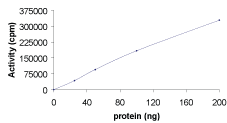
ZAP70, Active(Z02-10G)
FOR BULK ORDER REQUESTS PLEASE CONTACT US
Description :Recombinant full-length human ZAP70 was expressed by baculovirus in Sf9 insect cells using a N-terminal GST tag.
Species :Human
Tag :GST tag
Expression System:Sf9 insect cells using baculovirus
Sequence :Full Length
Genbank Number :NM_001079
Specific Activity :Sample Kinase Activity Plot. For specific information on a given lot, see related technical data sheet.
Purity :Sample Purity Data. For specific information on a given lot, see related technical data sheet. 
Storage, Stability and Shipping :Store product at –70oC. For optimal storage, aliquot target into smaller quantities after centrifugation and store at recommended temperature. For most favorable performance, avoid repeated handling and multiple freeze/thaw cycles.
Applications :Kinase Assay, Western Blot
Molecular Weight :~96 kDa
Gene Aliases :SRK; STD; ZAP-70
Scientific Background :ZAP70 is a non-receptor protein tyrosine kinase (part of the Syk/Zap70 family) that is involved in signaling by the T-cell antigen receptor (TCR). Ligation of the TCR/CD3 receptor in Jurkat T-cells induces phosphoprotein complexes which contain ZAP70 (1). TCR zeta chains are initially phosphorylated by p56Lck that lead to the recruitment of ZAP70 via its SH2 domain. ZAP70 in turn phosphorylates other proteins in the TCR-phosphoprotein complex. One of the natural substrates for ZAP70 is the zeta-chain dimer of the TCR/CD3 complex (2).
References :
1. Duplay, P. et al: p56lck interacts via its src homology 2 domain with the ZAP-70 kinase. J Exp Med. 1994 Apr 1;179(4):1163-72.
2. Chan, A C. et al: Differential expression of ZAP-70 and Syk protein tyrosine kinases, and the role of this family of protein tyrosine kinases in TCR signaling. J Immunol. 1994 May 15;152(10):4758-66.
Product Sheets (By Lot #) :
Research Areas :Cancer, Inflammation, NfkB Pathway, Cytoplasmic Tyrosine Kinases, Cancer, Inflammation, NfkB Pathway, Cytoplasmic Tyrosine Kinases
